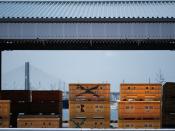Japan is one of the world's economic giants. Only that of the United States exceeds its economic output. The Japanese manufacture a wide range of products, including automobiles, computers, steel, television sets, textiles, and tires. The country's factories have some of the most highly developed equipment in the world. Japan has become a major economic power even though it has few natural resources. Japan imports many of the raw materials needed for industry and exports finished manufactured goods.
Early Japan was greatly influenced by the neighboring Chinese civilization. From the late 400's to the early 800's, the Japanese borrowed heavily from Chinese art, government, language, religion, and technology. During the mid-1500's, the first Europeans arrived in Japan. Trade began with several European countries, and Christian missionaries from Europe converted some Japanese. During the early 1600's, however, the rulers of Japan decided to cut the country's ties with the rest of the world.
They wanted to keep Japan free from outside influences. Japan's isolation lasted until 1853, when Commodore Matthew C. Perry of the United States sailed his warships into Tokyo Bay. As a result of Perry's show of force, Japan agreed in 1854 to open two ports to U.S. trade.
During the 1870's, the Japanese government began a major drive to revise the country. New ideas and manufacturing methods were imported from Western countries. By the early 1900's, Japan had become an industrial and military power.
In the late 19th century Japan was rapidly and thoroughly industrialized. Textiles were a leading item. Key elements of Japan's economy are manufacturing and trade. The country has few natural resources, so it must buy such necessities as aluminum, coal, lead, and petroleum. To pay for those imports, the government has adopted a strategy of exporting manufactured goods of high value. An especially important...


